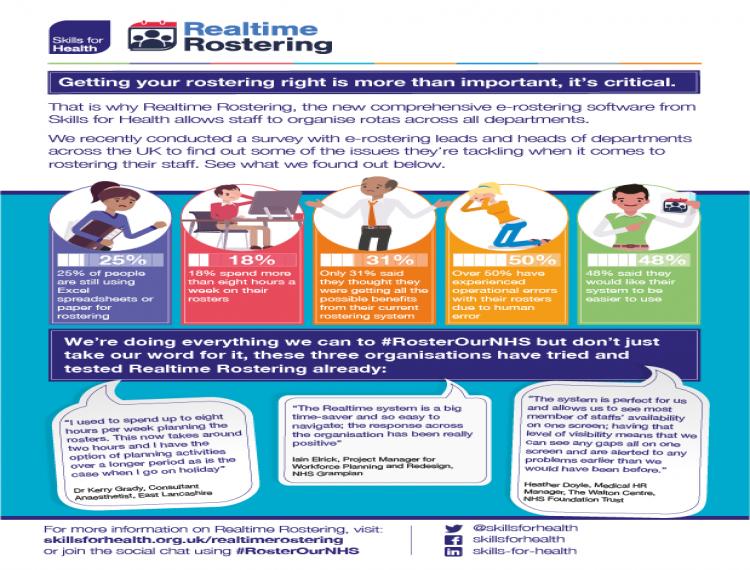Quarter of Healthcare Roster Managers are still using paper-based methods, survey reveals

This week (Tuesday 9 May), representatives from healthcare organisations across the country gathered in Birmingham for a national e-rostering conference where it was revealed a quarter of healthcare departments are using inefficient rostering tools.
80 delegates were attending the Effective Management of the Clinical Workforce event for a series of key-note speeches and workshops when the survey results were disclosed.
The survey, commissioned in January by Skills for Health, which provides workforce planning and organisational development solutions to the UK Healthcare sector, found that 25 per cent of people still use Excel or paper-based methods when creating rotas and a further 18 per cent said they spend more than eight hours a week on rostering.
The survey asked over 100 rostering specialists and heads of departments from across the UK to share their insights on workforce planning and the issues they tackle when creating rosters for their staff.
Further findings show that 50 per cent of respondents have experienced operational issues with their rosters due to human error and 48 per cent said they would like their current process to be simpler.
A key focus of the conference was how e-rostering can be used to help make organisations more efficient and better manage their staffs work life balance for a safer working environment. As the day unfolded, workshops were delivered by operational, clinical and workforce experts as well as a keynote session from NHS Employers Chief Executive, Danny Mortimer.
Laura Bick, Head of Corporate Services at Oxford University Hospitals NHS Foundation Trust attended the conference. She said: “Looking at the survey results, we definitely fall into the 25% that are still using Excel spreadsheets or paper-based methods! We’re going to be rolling out e-rostering across the hospital soon, so we came to today’s conference to try and get some tips on how best to do it. Our departments are still printing out their rosters and pinning them on the wall, so getting them to embrace change and start using e-rostering is going to be a challenge.
“After today’s talks, one thing we’ll definitely take away with us is that communication is really important, we should be telling our staff about the benefits of e-rostering first, rather than just presenting them with a massive immediate change to their routine.”
Skills for Health, one of the leading providers of e-rostering in the UK said: “With so many delegates with e-rostering responsibilities in one room, today’s conference was the perfect place to reveal our survey findings and to discuss the key benefits of e-rostering to a healthcare audience.
“From the survey and talking to peers today, although some healthcare organisations are making strides towards improving their rostering processes, there are still plenty falling behind. We want to spread the word about our own system, Realtime Rostering, and make people aware of how to reduce the time restraints and errors faced when creating rotas. The initial reception has been really positive.”
Realtime Rostering, the new comprehensive software from Skills for Health allows rotas to be organised across all departments. The simple, cost-effective tool offers a solution to workforce planning allowing teams to plan ahead and as a result, ensure their staff are delivering the very best in patient care.
For more information on Realtime Rostering, visit: skillsforhealth.org.uk/realtimerostering












Responses